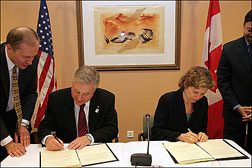Canadian government officials want domestic lumber companies to determine by Aug. 21 whether they will agree to drop outstanding lawsuits so that an agreement aimed at ending a long trade dispute between the two countries can become final.
 |
| Canadian International Trade Minister David Emerson (second from left) and U.S. Trade Representative Susan Schwab initial lumber pact July 1 in Geneva (Photo courtesy of Foreign Affairs and International Trade Canada) |
As the deadline neared, the pro-agreement side received a boost when British Columbia Premier Gordon Campbell said on Aug. 16 that his provincial government would support the pact, after the U.S. and Canada agreed to add some provisions British Columbia wanted.
Canadian and U.S. Officials announced the seven-year-long pact in April and initialed detailed language for the agreement on July 1. It would end limits on Canadian lumber exports when prices exceed $355 per thousand board feet. Shipments would face export charges if prices fall below that level. Both sides also said they would drop litigation and agreed that Canadian companies would receive 80% of the estimated $5 billion in duties that the U.S. has collected since 2002.
 |
| British Columbia Premier Campbell says his province is backing the pact (Photo courtesy of British Columbia government, Office of the Premier) |
British Columbia's Campbell said that the negotiators had agreed to several provisions, which include accepting his province's pricing system, adding a six-month termination clause that can be triggered after the pact has been in place for 18 months, and a one-year "standstill" provision after the agreement's seven-year term ends. Campbell said, "While not perfect, the agreement is a reasonable deal for British Columbia and will provide greater stability and certainty."
After an Aug. 9 meeting in Toronto with Canadian lumber industry representatives, Canada's International Trade Minister, David L. Emerson, said there was "a significant amount of support in the room" for the pact. But he acknowledged that some of the companies "have issues and concerns" about the agreement. Emerson said government officials would follow up on unspecified issues that need to be clarified and do "some administrative tidying up."
"At the end of the day," he said,"I think that we all agreed if we can get this agreement tidied up that we would be able to achieve a substantial degree of support from the industry."
Emerson said he had asked the industry executives to let him know by Aug. 21
|
which companies support the trade pact, so that he can make a recommendation to the Cabinet and Prime Minister Stephen Harper on whether or not the government can proceed with the agreement.
Emerson added, "We do not intend to reopen it and modify it in any substantial way. So this is the deal."
For that deal to proceed, Canada needs to have approval from companies representing 95% of the duties the U.S. has collected. But Emerson said the "stronger hurdle" is getting the lumber industry to agree to drop its litigation.
"If we get substantial support to cease litigation the [duty] deposit mechanism and 95% [threshold] would not be an insurmountable hurdle," he said.
 Related Links:
Related Links: 